Core Faculty
Yisong Yue, Co-Director
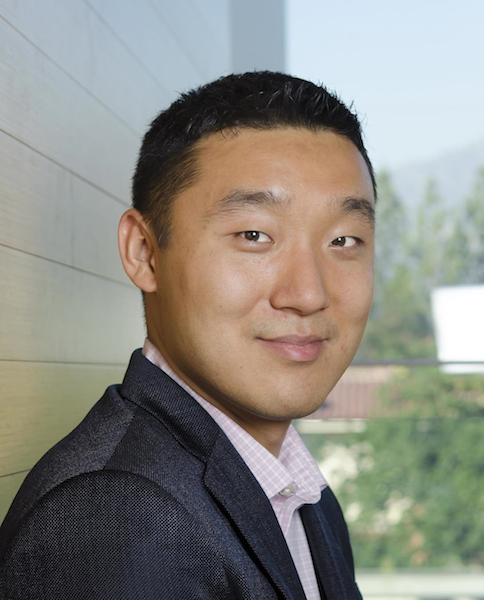
Professor Yue's research interests lie primarily in the theory and application of statistical machine learning. He is particularly interested in developing novel methods for spatiotemporal reasoning, structured prediction, interactive learning systems, and learning with humans in the loop. In the past, his research has been applied to information retrieval, recommender systems, text classification, learning from rich user interfaces, analyzing implicit human feedback, data-driven animation, sports analytics, policy learning in robotics, and adaptive routing & allocation problems.
 Anima Anandkumar, Co-Director
Anima Anandkumar, Co-Director
Professor Anandkumar's research interests are in the areas of large-scale machine learning, non-convex optimization and high-dimensional statistics. In particular, she has been spearheading the development and analysis of spectral methods which involve matrix and tensor decompositions. She is now a principal scientist at Amazon web services where she explores the intersections of theory and practice of large-scale machine learning.
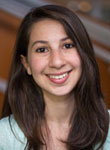 Katie Bouman's research focuses on computational imaging: designing systems that tightly integrate algorithm and sensor design, making it possible to observe phenomena previously difficult or impossible to measure with traditional approaches. Imaging plays a critical role in advancing science. However, as science continues to push boundaries, traditional sensors are reaching the limits of what they can measure. Katie's group combines ideas from signal processing, computer vision, machine learning, and physics to find and exploit hidden signals for both scientific discovery and technological innovation.
Katie Bouman's research focuses on computational imaging: designing systems that tightly integrate algorithm and sensor design, making it possible to observe phenomena previously difficult or impossible to measure with traditional approaches. Imaging plays a critical role in advancing science. However, as science continues to push boundaries, traditional sensors are reaching the limits of what they can measure. Katie's group combines ideas from signal processing, computer vision, machine learning, and physics to find and exploit hidden signals for both scientific discovery and technological innovation.
For example, in collaboration with the Event Horizon Telescope,
Katie's group is helping to build a computational earth-sized
telescope that is taking the first images of a black hole and is
analyzing its images to learn about general relativity in the
strong-field regime.
 Joel Burdick focuses on robotics, kinematics, mechanical systems and control. Active research areas include: robotic locomotion, sensor-based motion planning algorithms, multi-fingered robotic manipulation, applied nonlinear control theory, neural prosthetics, and medical applications of robotics.
Joel Burdick focuses on robotics, kinematics, mechanical systems and control. Active research areas include: robotic locomotion, sensor-based motion planning algorithms, multi-fingered robotic manipulation, applied nonlinear control theory, neural prosthetics, and medical applications of robotics.
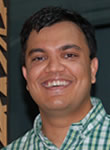 Venkat Chandrasekaran's research interests broadly lie in mathematical optimization and its application to the information sciences. He seeks a deeper understanding of the power as well as the limitations of convex optimization, with a focus on the development of efficient algorithms for challenging problems in statistical signal processing. A recurring theme in his work is the prominent role played by various notions of algebraic structure in explaining the effectiveness of convex relaxation methods.
Venkat Chandrasekaran's research interests broadly lie in mathematical optimization and its application to the information sciences. He seeks a deeper understanding of the power as well as the limitations of convex optimization, with a focus on the development of efficient algorithms for challenging problems in statistical signal processing. A recurring theme in his work is the prominent role played by various notions of algebraic structure in explaining the effectiveness of convex relaxation methods.
 Mani Chandy works in two related areas: (1) sense & respond systems that detect and respond to critical events and (2) methods for developing reliable distributed systems, particularly distributed control systems. This work develops theory, builds prototypes, and is interdisciplinary straddling control theory, stochastic processes and statistics, optimization and game theory, and temporal logic.
Mani Chandy works in two related areas: (1) sense & respond systems that detect and respond to critical events and (2) methods for developing reliable distributed systems, particularly distributed control systems. This work develops theory, builds prototypes, and is interdisciplinary straddling control theory, stochastic processes and statistics, optimization and game theory, and temporal logic.
 Tim Colonius develops and applies data-driven dentification, reduced-order modeling, and control to fluid dynamical systems. Application areas include turbulent flows, aeroacoustics, multiphase flows and biomedical applications of ultrasound. He and his group also develop algorithms for large-scale computation of fluid flow and curate large datasets appropriate for statistical and machine-learning.
Tim Colonius develops and applies data-driven dentification, reduced-order modeling, and control to fluid dynamical systems. Application areas include turbulent flows, aeroacoustics, multiphase flows and biomedical applications of ultrasound. He and his group also develop algorithms for large-scale computation of fluid flow and curate large datasets appropriate for statistical and machine-learning.
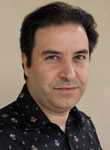 Babak Hassibi's research is in communications, information theory, signal processing, and control. He is currently most interested in various information-theoretic and algorithmic aspects of wireless communications, especially wireless networks. Other interests include adaptive signal processing and neural networks; blind channel equalization; statistical signal processing; robust estimation and control, especially connections between robustness and adaptation; and linear algebra, with emphasis on fast algorithms, random matrices and group representation theory.
Babak Hassibi's research is in communications, information theory, signal processing, and control. He is currently most interested in various information-theoretic and algorithmic aspects of wireless communications, especially wireless networks. Other interests include adaptive signal processing and neural networks; blind channel equalization; statistical signal processing; robust estimation and control, especially connections between robustness and adaptation; and linear algebra, with emphasis on fast algorithms, random matrices and group representation theory.
 Pietro Perona is interested in vision: how useful information about the environment may be computed from pictures. He is interested both in biological vision (perception, neural computation) and in computer vision (representations, algorithms). Current work includes visual recognition, the perception of behavior, and the control of behavior from visual input.
Pietro Perona is interested in vision: how useful information about the environment may be computed from pictures. He is interested both in biological vision (perception, neural computation) and in computer vision (representations, algorithms). Current work includes visual recognition, the perception of behavior, and the control of behavior from visual input.
 Andrew Stuart's research is focused on the development of foundational
mathematical and algorithmic frameworks for the seamless integration of
models with data. He works in the Bayesian formulation of inverse problems
for differential equations, and in data assimilation for dynamical systems.
Andrew Stuart's research is focused on the development of foundational
mathematical and algorithmic frameworks for the seamless integration of
models with data. He works in the Bayesian formulation of inverse problems
for differential equations, and in data assimilation for dynamical systems.
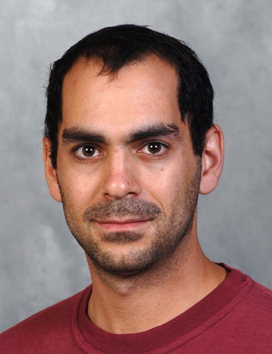 Omer Tamuz studies how people exchange information and learn from each other, using game theoretical, probabilistic and statistical tools. He is also interested in machine learning, and in particular in how machines and people can learn, work and play together.
Omer Tamuz studies how people exchange information and learn from each other, using game theoretical, probabilistic and statistical tools. He is also interested in machine learning, and in particular in how machines and people can learn, work and play together.
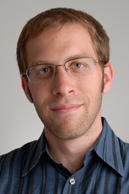 Joel Tropp invents and analyzes algorithms for fundamental problems in linear algebra, optimization, and machine learning. He also develops mathematics to make this analysis more transparent. His current interests include constrained matrix factorization, random matrix theory, and universality laws for statistical problems.
Joel Tropp invents and analyzes algorithms for fundamental problems in linear algebra, optimization, and machine learning. He also develops mathematics to make this analysis more transparent. His current interests include constrained matrix factorization, random matrix theory, and universality laws for statistical problems.
 Adam Wierman's research interests center around resource allocation and scheduling decisions in computer systems and services. More specifically, his work focuses both on developing analytic techniques in stochastic modeling, queueing theory, scheduling theory, and game theory, and applying these techniques to application domains such as energy-efficient computing, data centers, social networks, and the electricity grid.
Adam Wierman's research interests center around resource allocation and scheduling decisions in computer systems and services. More specifically, his work focuses both on developing analytic techniques in stochastic modeling, queueing theory, scheduling theory, and game theory, and applying these techniques to application domains such as energy-efficient computing, data centers, social networks, and the electricity grid.
Affiliated Faculty at Caltech
- Yaser Abu-Mostafa, Electrical Engineering and Computer Science
- R. Michael Alvarez, Humanities & Social Sciences
- Aaron Ames, Control and Dynamical Systems and Mechanical and Civil Engineering
- Jim Beck, Computing & Mathematical Sciences and Mechanical & Civil Engineering
- Soon-Jo Chung, Aerospace
- John Doyle, Control & Dynamical Systems
- Frederick Eberhardt, Humanities & Social Sciences
- Federico Echenique, Humanities & Social Sciences
- Azita Emami, Electrical Engineering
- Victoria Kostina, Electrical Engineering
- Steven Low, Computing & Mathematical Sciences and Electrical Engineering
- Richard Murray, Control & Dynamical Systems
- Houman Owhadi, Applied & Computational Mathematics and Control & Dynamical Systems
- Lior Pachter, Computational Biology
- Antonio Rangel, Neuroscience, Behavior Biology and Economics
- Leonard Schulman, Computer Science
- Thanos Siapas, Computation and Neural Systems
- Chris Umans, Computer Science
- Leeat Yariv, Humanities & Social Sciences
Affiliated Groups
- The Caltech Rigorous Systems Research Group (RSRG)
- The Center for Data-Driven Discovery at Caltech (CD3)
- Computational Vision at Caltech
- JPL Center for Data Science and Technology
- The JPL Robotics Group
- The Social and Information Sciences Laboratory at Caltech (SISL)
Postdoctoral Fellows
Current
- Oisin Mac Aodha
- Steve Branson
- Yuxin Chen
- Matthew Dunlop
- Taehwan Kim
- Shiwei Lan
- Angie Liu
- Cristina Segalin
- Yanan Sui
- Ke Wang
- Qi Yu
Recent Alumni
- Margareta Ackerman, Assistant Professor, Florida State University
- Sachin Adlakha, Data Scientist, AYASDI
- Brendan Ames, Assistant Professor, University of Alabama
- Yakov Babichenko, Assistant Professor, The Technion
- Siddharth Barman, Assistant Professor, Indian Institute of Science
- Quentin Berthet, Lecturer, University of Cambridge
- Umang Bhaskar, Tata Institute of Fundamental Research, India
- Alex Dimakis, Faculty, University of Texas, Austin
- Krishnamurthy (Dj) Dvijotham, Pacific Northwest National Laboratory
- Brendan Farrell, Founder, HowLoud
- Hu Fu, Assistant Professor, University of British Columbia
- Risi Kondor, Assistant Professor, University of Chicago
- Enrique Mallada, Faculty, Johns Hopkins University
- Jason Marden, Assistant Professor, UC Santa Barbara
- Georgios Piliouras, Assistant Professor, Singapore University of Technology & Design
- Ben Recht, Associate Professor, UC Berkeley
- Madeleine Udell, Cornell University
- Yunjian Xu, Assistant Professor, Singapore University of Technology and Design
- Romann Weber, Disney Research
Graduate Students
Current
- Navid Azizan-Ruhi
- Sara Beery
- Natalie Bernat
- Utkan Candogan
- Niangjun Chen
- Gautam Goel
- David Hall
- Hoang Le
- Zachary Lee
- Palma London
- Joe Marino
- Mason McGill
- Riley Murray
- John Pang
- Xiaoqi Ren
- Matteo Ronchi
- Serim Ryou
- Yong Sheng Soh
- Jialin Song
- Armeen Taeb
- Alvita Tran
- Grant Van Horn
- Ramya Korlakai Vinayak
- Eric Zhan
- Stephan Zheng
- Juba Ziani
Recent Alumni
- Ron Appel
- Elizabeth Bodine-Baron, RAND Corporation
- Subhonmesh Bose, Assistant Professor, University of Illinois Urbana-Champaign
- John Bruer
- Agostino Capponi, Assistant Professor, Columbia University
- Krzysztof Chalupka
- Bo Chen
- Rachel Cummings
- Eyrun Eyjolfsdottir
- Matthew Faulkner
- Alex Gittens, AMPLab, UC Berkeley
- Na Li, Assistant Professor, Harvard University
- Minghong Lin, Facebook
- Zhenhua Liu, Assistant Professor, Stony Brook University
- Michael McCoy, Qadium
- Judy Xingyue Mou, Google
- Peter Stobbe, Optiver